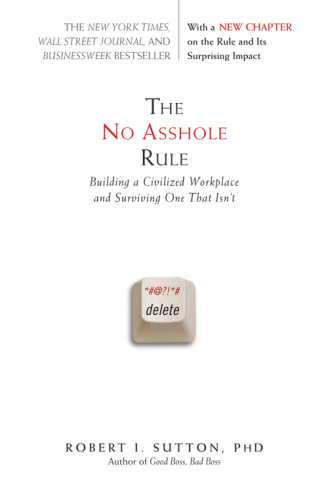
The No Asshole Rule
Building a Civilized Workplace and Surviving One That Isn't
کتاب های مرتبط
- اطلاعات
- نقد و بررسی
- دیدگاه کاربران
نقد و بررسی

January 29, 2007
Expletive or not, by the end of this book, listeners will be desensitized to the word "asshole," which is said hundreds of times in this audiobook. Sutton's premise seems pretty simple: get rid of arrogant jerks in the work place from every level of an organization. Through each chapter, he explores a different aspect of assholes, from identifying the type to dealing with them to what one should do if they believe they are an asshole to why it may be beneficial to keep one or two around. You'd think with a title like The No Asshole Rule, some humor would follow, but that's where the book falters. It's too serious and often too simplistic in its resolutions for curing the asshole problem at work. Sutton's reading of his own words lacks conviction. The interview with the author at the end proves interesting since his answers feel more candid than the rehearsed words of the audiobook.

March 15, 2007
Sutton (Weird Ideas That Work ) has taught management science and engineering for more than a decade at Stanford University, where he formed his early opinions about recruiting, hiring, and retaining pleasant yet effective colleagues. Here he deals with organizational dynamics. Unlike many books (e.g., Jean A. Hollands'sRed Ink Behavior and Robert Herbold'sThe Fiefdom Syndrome ), Sutton's does not postulate that destructive behaviors need to be corrected or that the employees responsible for these behaviors need to be fired. Instead, he suggests that we are all difficult sometimes and that being difficult can, in certain scenarios, actually contribute to our effectiveness as managers. He balances this argument with the premise that some people are "certified assholes" who are difficult to fire because they are often in positions of authority and are mistakenly deemed talented and effective by their superiors. Sutton's book is very readable, and people in any type of organization with "people problems" would benefit from using it to inspire some fresh thinking. Large general circulation libraries might include it in a section about careers or management; corporate libraries with a human resources section should also consider.Stephen Turner, Turner & Assocs., San Francisco
Copyright 2007 Library Journal, LLC Used with permission.

February 1, 2007
We all know them or know of them--the jerks and bullies at work who demean, criticize, and sap the energy of others, usually their underlings. It could be the notorious bad boss or the jealous coworker, but everyone agrees that they make life miserable for their victims and create a hostile and emotionally stifling environment. Fed up with how these creeps treat others and poison the workplace, Sutton declares war and comes out calling them exactly what they are--"certified assholes." Caricatured in sitcoms such as " The Office," these brutes are too often tolerated until irreparable damage is done to individuals and the organization as a whole. Sutton's "no asshole rule" puts a stop to the abuse in no uncertain terms. Similar rules have transformed such companies as JetBlue, the Men's Wearhouse, and Google into shining examples of workplaces where positive self-esteem creates a more productive, motivated, and satisfied workforce. If you have ever been a victim, just reading Sutton's analysis brings calm relief, empowerment, and reassurance that you're not alone.(Reprinted with permission of Booklist, copyright 2007, American Library Association.)

























دیدگاه کاربران